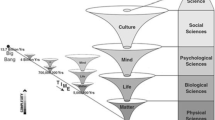Abstract
Science is an enterprise whose chief goal is the effective dealing with events rather than, as implied by much current research in psychology, primarily an endeavor to “understand” or “explain,” i.e., to arrive at acceptable verbalizations about events. The most effective dealing with events is termed “synthesis”: the reliable production of orderly consequences. Verbalizations by the investigator can contribute to synthesis in two ways: by acting themselves as synthesizing events and by describing the events to be manipulated in order to achieve synthesis. Confusion arises and the goals of science are subverted both when this distinction is not maintained and when the scientist’s words themselves are taken to constitute the subject matter to be investigated.
Similar content being viewed by others
References
BRIDGMAN, P. W. 1959 The way things ar. Cambridge: Harvard University Press.
CATANIA, A. C. 1969. Editorial: On the vocabulary and the grammar of behavior. Journal of the Experimental Analysis of Behavior., 12, 845–846.
CHAMBERLIN, T. C. 1965. The method of multiple working hypotheses. Science., (1890) 148, 754–759.
CRONBACH, L. J., & MEEHL, P. E. 1955. Construct validity in psychological tests. Psychological Bullet., 52, 281–301.
DAY, W. F. 1969. Radical behaviorism in reconciliation with phenomenology. Journal of the Experimental Analysis of Behavior., 12, 315–328.
EBEL, R. L. 1961. Must all tests be valid? American Psychologist., 640–647.
EINSTEIN, A. 1933. On the method of theoretical physics. New York: Oxford University Press.
EVANS, R. I. 1968. B. F. Skinner: The man and his ideas. New York: Dutton.
FEIGL, H. 1959. Philosophical embarrassments of psychology. American Psychologist., 14, 115–128.
FERSTER, C. B., & HAMMER, C. E., Jr. 1966. Synthesizing the components of arithmetic behavior. In W. Honig (Ed), Operant behavior: Areas of research and application. New York: Appleton-Century-Crofts. Pp. 634–676.
FEYNMAN, R. T., LEIGHTON, R. B., & SANDS, M. 1963. The Feynman lectures on physics. Vol. I. Reading, Mass: Addison-Wesley.
GARNER, W. R., HAKE, H. W., & ERIKSEN, C. W. 1956. Operationism and the concept of perception. Psychological Review., 63, 149–159.
GILBERT, T. F. 1962. Mathetics: The technology of education. Journal of Mathetics., 1, 7–73.
GREENSPOON, J. 1955. The reinforcing effect of two spoken sounds on the frequency of two responses. American Journal of Psychology., 68, 409–416.
HART, H., & SCHUETZ, R. D. 1959. A short course in organic chemistry. Boston: Houghton-Mifflin.
HELMER, O., & RESCHER, N. 1960. On the epistemology of the inexact science. Santa Monica: Rand Corporation.
HITT, W. D. 1969. Two models of man. American Psychologist., 24, 651–657.
HOLZ, W. C, & AZRIN, N. H. 1966. Conditioning human verbal behavior. In W. Honig (Ed.), Operant Behavior: Areas of research and application. New York: Appleton-Century-Crofts. Pp. 790–826.
HOMANS, G. C. 1969. The sociological relevance of behaviorism. In R. L. Burgess & D. Bushell, Jr. (Eds.), Behavioral sociology: The experimental analysis of social process. New York: Columbia University Press. Pp. 1–24.
KANTOR, J. R. 1953. The logic of modern Science. Granville, Ohio: Principia Press.
KAPLAN, A. 1964. The conduct of inquiry. San Francisco: Chandler.
KATAHN, M., & KOPLIN, J. H. 1968. Paradigm clash: Comment on “Some recent criticisms of behaviorism and learning theory with special reference to Breger and McGaugh and to Chomsky” Psychological Bullet., 69, 147–148.
LAWSON, R. 1965. Frustration. The development of a scientific concep. New York: Macmillan.
LOCKHARD, R. B. 1971. Reflections on the fall of Comparative Psychology: Is there a message for us all? American Psychologis., 26, 168–179.
MADDEN, E. H. 1960. The structure of scientific though. Boston: Houghton-Mifflin.
MAHER, B. A. 1966. Principles of psychopatholog. New York: McGraw-Hill.
MILLER, G. A. 1962. Psychology: The science of mental life. New York: Harper & Row.
MORSE, W. H. 1966. Intermittent reinforcement. In W. Honig (Ed.), Operant behavior: Areas of research and applicatio. New York: Appleton-Century-Crofts. Pp. 52–108.
New universal language for science? Scientific Resear., 1969 (May 26), p. 28.
NOTTERMAN, J. M., & MINTZ, D. E. 1965. Dynamics of respons. New York: Wiley.
PLATT, J. R. 1964. Strong inference. Science., 146, 347–353.
POLANYI, M. 1968. Logic and psychology. American Psychologis., 23, 27–43.
POPPER, K. 1959. The logic of scientific discover. New York: Basic.
PREMACK, D. 1970. A functional analysis of language. Journal of the Experimental Analysis of Behavior., 14, 107–125.
REICHENBACH, H. 1951. The rise of scientific philosoph. Berkeley: University of California Press.
SIDMAN, M. 1960. Tactics of scientific research. New York: Basic.
SKINNER, B. F. 1957. Verbal behaviour. New York: Appleton-Century-Crofts.
SKINNER, B. F. 1969. Contingencies of reinforcement: A theoretical analysis. New York: Appleton-Century-Crofts.
STEVENS, S. S. 1966. Operations or words? Psychological monography. 80, (19), 33–38.
VERPLANCK, W. S. 1962. Unaware of where’s awareness. Journal of Personality., 30, 130–158.
WANN, T. W. 1964. Behaviorism and phenomenology. Chicago: University of Chicago Press.
WEAVER, W. 1961. The imperfections of science. American Scientist., 49, 99–113.
WHITEHEAD, A. N. 1960. The first physical synthesis. In E. H. Madden (Ed.), The structure of scientific thought. Boston: Houghton-Mifflin. Pp. 42–50.
WIEST, W. M. 1967. Some recent criticisms of behaviorism and learning theory with special reference to Breger and McGaugh and to Chomsky. Psychological Bulletin., 67, 214–225.
Author information
Authors and Affiliations
Additional information
The views expressed herein are the author’s and do not necessarily reflect those of the U. S. Air Force or the Department of Defense. The author wishes to thank D. N. Farrer and A. G. Koestler, who made helpful comments on an earlier version of this paper.
The term synthesis occasionally has a different usage; e.g., Alfred North Whitehead called Galileo’s theoretical contributions “The first physical synthesis” (Madden, 1960), and R. B. Lockard (1971) has referred to the current synthesis in biology. This paper will suggest that analysis (in such cases comprehensive or extended) is a more appropriate term for this aspect of the scientist’s behavior.
Rights and permissions
About this article
Cite this article
Wynne, L. Behavior Analysis and Behavior Synthesis. Psychol Rec 21, 171–179 (1971). https://doi.org/10.1007/BF03394006
Published:
Issue Date:
DOI: https://doi.org/10.1007/BF03394006



